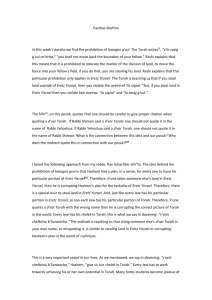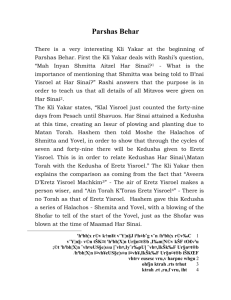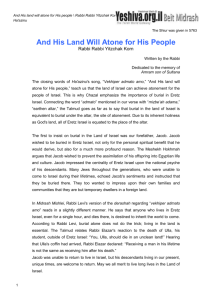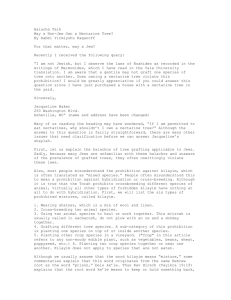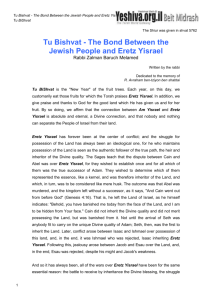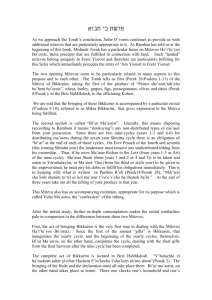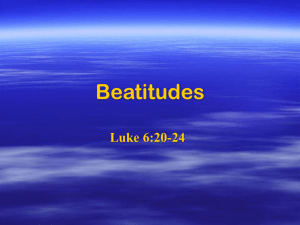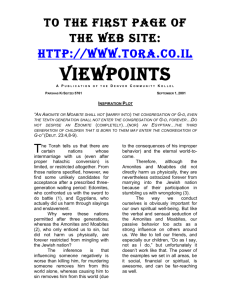The reasons that it is imperative to bring Rebbe Nachman`s grave to
advertisement
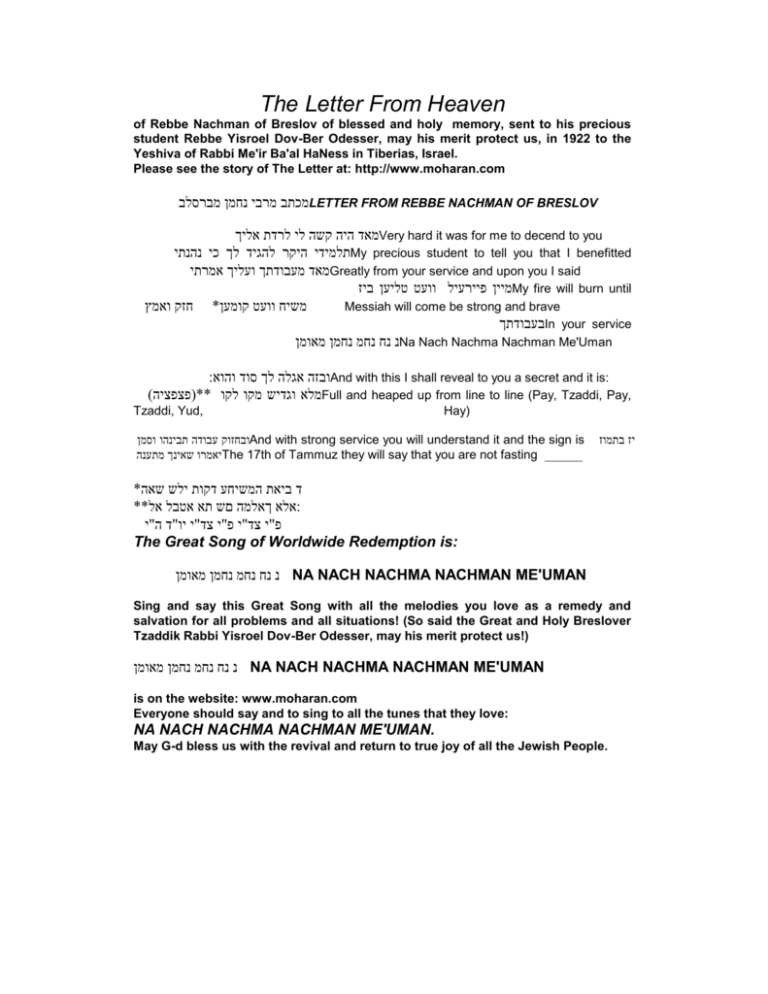
The Letter From Heaven of Rebbe Nachman of Breslov of blessed and holy memory, sent to his precious student Rebbe Yisroel Dov-Ber Odesser, may his merit protect us, in 1922 to the Yeshiva of Rabbi Me'ir Ba'al HaNess in Tiberias, Israel. Please see the story of The Letter at: http://www.moharan.com מכתב מרבי נחמן מברסלבLETTER FROM REBBE NACHMAN OF BRESLOV מאד היה קשה לי לרדת אליךVery hard it was for me to decend to you תלמידי היקר להגיד לך כי נהנתיMy precious student to tell you that I benefitted מאד מעבודתך ועליך אמרתיGreatly from your service and upon you I said מיין פיירעיל וועט טליען ביזMy fire will burn until משיח וועט קומען* חזק ואמץ Messiah will come be strong and brave בעבודתךIn your service נ נח נחמ נחמן מאומןNa Nach Nachma Nachman Me'Uman :ובזה אגלה לך סוד והואAnd with this I shall reveal to you a secret and it is: )מלא וגדיש מקו לקו **(פצפציהFull and heaped up from line to line (Pay, Tzaddi, Pay, Tzaddi, Yud, Hay) ובחזוק עבודה תבינהו וסמןAnd with strong service you will understand it and the sign is יאמרו שאינך מתענהThe 17th of Tammuz they will say that you are not fasting ______ יז בתמוז *ד ביאת המשיחע דקות ילש שאה **אלא ךאלמה םש תא אטבל אל: פ"י צד"י פ"י צד"י יו"ד ה"י The Great Song of Worldwide Redemption is: נ נח נחמ נחמן מאומןNA NACH NACHMA NACHMAN ME'UMAN Sing and say this Great Song with all the melodies you love as a remedy and salvation for all problems and all situations! (So said the Great and Holy Breslover Tzaddik Rabbi Yisroel Dov-Ber Odesser, may his merit protect us!) נ נח נחמ נחמן מאומןNA NACH NACHMA NACHMAN ME'UMAN is on the website: www.moharan.com Everyone should say and to sing to all the tunes that they love: NA NACH NACHMA NACHMAN ME'UMAN. May G-d bless us with the revival and return to true joy of all the Jewish People. Rosh Benei Yisroel B'Eretz Yisroel: The Head of the Children of Israel in the Land of Israel [ReBY EBaY] With G-d's Help Concerning Bringing the Holy Grave of Our Holy Teacher Rabbeinu Rebbe Nachman of Breslov of blessed memory to Eretz Yisroel 1. It is well-known in all parts of the world that all the Tzaddikim in all the generations yearned and desired with all their hearts to be buried in Eretz Yisroel [the Land of Israel]. And even more Rabbeinu [Our Holy Teacher] Rebbe Nachman of Breslov revealed with a full mouth in a completely unambiguous manner that cannot be interpreted in two ways that his holy desire was to be buried in Eretz Yisroel, our Holy Land, desire of all the hearts, as his chief student, Rabbi Nosson of blessed memory, wrote in Chayay Mohoran [The Lives of Our Master and Teacher Rebbe Nachman, translated into English as Tzaddik] (His Trip to Navritch, paragraph 12): "and Rabbeinu said that he desired to travel to Eretz Yisroel and to pass away there, but he was afraid lest he not be able to arrive there, and also if he were to pass away there people would not come to his grave and would not have anything to do with his grave...but if he would be laid to rest in our country [the Ukraine in those days in the early 1800s] for certain we would come to his grave to study and to pray there, and he would have great pleasure and delight from this." 2. And similarly wrote Rabbi Nathan, of blessed memory, in the book Yemay Mohornat [The Days of Our Master and Teacher Rabbi Nathan] (Part One, Section 26): "And immediately, as soon as he [Rabbeinu] contracted tuberculosis the first time, he said that he would pass away from this, and right away he began to speak about his passing and about his grave and that his desire was to travel to Eretz Yisroel, but he did not know if he had the strength to reach there, and also no one would come to his grave and the world would have nothing to do with his grave." 3. We see from all the above clear and open words from Rabbeinu of blessed memory that his holy desire was to be buried in Eretz Yisroel, desire of all the hearts, and the desire of all the Tzaddikim of all the generations, except for two reasons that the time and the period caused that prevented him from doing this: a) The doubt that, because of the opposition to him, and especially the fact that he was ill, this would cause him not to merit to pass away in Eretz Yisroel and that he would not merit even to be buried there. For it is known that in those days they did not transport bodies on ships from one country to another, and even if someone died on a journey in the middle of the sea, if they would arrive quickly to some island or similarly then they would leave him there, and if not they would throw the body to the fishes of the sea, for they did not keep or have the possibility of keeping a corpse on a ship. b) Rabbeinu, of blessed memory, suspected correctly that if in those days he would be buried in Eretz Yisroel, then no one would come to his grave and that people would have nothing to do with him, and also consequently with the passing of time all of his Holy Path and the awesome Fear of Heaven and the amazing ways of serving G-d that he introduced and left in the world would disappear. And here it is fitting to quote the words of Rabbi Avraham son of Rabbi Nachman of Tulchin of blessed memory (Bi'ur Halikutim 155): "For is it not known that the Torah speaks in the language of people, and also his [Rabbeinu's] holy words concerning all that he said and spoke about this, that because of the very great danger that most travellers to Eretz Yisroel encountered he knew clear as day that no one would be aroused to travel to his holy grave. For even though he was laid to rest in this land [Ukraine], many of his followers became very scattered after his holy passing. For on Rosh Hashanah in his holy lifetime approximately five to six hundred people came to him in Uman for the last Rosh Hashanah, and people would say that about one thousand people came to him then, as I heard from my father of blessed memory in the name of Rabbi Nathan of blessed memory. And afterwards, on the first Rosh Hashanah after his holy passing, only sixty or so people came to his grave. [We see from this that even when Rabbeinu of blessed memory was buried in Uman amongst his followers, approximately 90 per cent !!! of his followers in his lifetime had separated from him greatly immediately after his passing, and all the more so if he had travelled to Eretz Yisroel to pass away there, then certainly there would have been only a few individuals from the greatest of his followers who would have travelled there, and with the passing of time the matter would have been forgotten completely.] 4. And behold: the two reasons cited above, that Rabbeinu of blessed memory mentioned as singular reasons that prevented him in his time from being buried in Eretz Yisroel, already are invalid today. And just the opposite: the central calculation in determining his holy burial place was what Rabbeinu of blessed memory wanted: that the maximum number of people be able to come to his grave, as mentioned above in Yemay Mohornat, and as Rabbi Nathan wrote further in the book Chayay Mohoran (His Journey to Navritch, section 12): "from that time and on he spoke often about his passing and about his grave and revealed his mind many times in many forms of expression that people always should come to his grave to say Psalms on his grave and to learn there and to say many prayers and supplications there, and he spoke with a number of people about this. Also when he returned from Lemberg he said that there it would be good for him to pass away and to be buried there, since many many great Tzaddikim are buried there [such as the Taz, the Chacham Tzvi, the Penai Yehoshua, Rabbi Chaim Rappoport, the holy Rabbis Rabbis Chaim and Yehoshua Reitches, who were killed in the sanctification of G-d's Name, and many many others, all of whom are of blessed and holy memory]. But since not one of his followers would come to his grave there [even though there is only a total of 400 kilometers between Uman and Lemberg], for this reason he did not want to pass away there. And he said that when someone would come to his grave and would say a chapter of Psalms with arousal of the heart, he would have a great delight from this. And he made motions with his body and his bones then, and he implied that he would have freeing of the bones inside his grave when people would say Psalms on his grave, and he spoke more about this matter a number of times. And so, since the central determination of the location of his resting place was that the greatest number of people would be able to come to him to study and to pray, and only because of this was he prevented from being buried in Eretz Yisroel; how much more so, when we will merit in our days that our Teacher of blessed memory will be buried in Eretz Yisroel, that his blessed desire will be fulfilled from all sides and from all directions, with great dignity and power, and that there even will come the time when more people will come to him in Eretz Yisroel in one day than come to him in the Ukraine throughout the entire year put together. 5. It also is explained in a number of places in the writings of Rabbi Avraham son of Rabbi Nachman (Sichot veSippurim, section 16, and see also in the writings of the Pelach) that the intent of Yosef the Tzaddik that they bring his bones up [to Eretz Yisroel] was two-fold: one reason was to be buried in Eretz Yisroel, and the second reason was that people become attached to him through this. [See Genesis 47:2831; 50:1-13; 50:22-26; Exodus 13:19.] And see also in his writings in a number of places the implications for the Final Redemption of Israel in the matter, that everything depends on the greatest number of people coming to the grave of Rabbeinu of blessed memory. And if so what can we say, and the glory of God is to hide the matter, and the principle is that the Final Redemption is like the First [from Egypt] and that everything depends on the bones of the Tzaddik. 6. Our Teacher of blessed memory further said (Chayay Mohoran, His Journey to Navritch, section 6): "My place is only Eretz Yisroel; all that I travel I travel only to Eretz Yisroel." And Rabbi Avraham son of Rabbi Nachman of blessed memory concludes (Bi'ur Halikutim, ibid.): "that there in Eretz Yisroel is his true and eternal place." Look there. And see in Sefer HaMiddos [The Book of Traits] (Money, part 2, section 7) that an Israeli man must yearn for burial in Eretz Yisroel, and he revealed a minute amount of the rectifications that are achieved through this. And certainly Rabbeinu of blessed memory fulfills himself what he teaches to others. What comes out from all the above discussion is that Rabbeinu of blessed memory yearns greatly to be buried in the Land of Israel, delight of all the hearts, like all the Tzaddikim in all the generations (and see further below in Answers to Objections (1), at length), and as he revealed his desire with a full mouth. And may it be God's Will that his holy desire be fulfilled. Answers to Objections and Rejoinders (and clarification of a number of matters, including the halachic [Jewish Law] portion) In opposition to what is written above are heard the following objections: 1) That the matter is forbidden according to halacha 2) That Rabbeinu of blessed memory desired to be buried in Uman and nowhere else 3) That the reality is that since Rabbeinu is buried there, this is his place from Heaven 4) That Rabbeinu did not say explicitly to bring him up [after his passing] to Eretz Yisroel 5) That the matter is dangerous 6) That Rabbeinu of blessed memory works to rectify the souls [of the 30,000 Jews who were killed in Sanctification of G-d's Name and who are buried with Rabbeinu in Uman] 7) That in everything that Rabbeinu of blessed memory did there are other hidden reasons 8) The comment of Rabbi Nathan that the place [the gravesite in Uman] was prepared and made ready from the Six Days of Creation 9) Comments from Rabbi Nathan in Likutay Halachot [Collected Laws] 10) Comments and traditions that have no legitimate basis 11) Lack of modesty 12) That people will learn to move around graves in Eretz Yisroel, and also abroad 13) That perhaps the body will not be found intact [as per Jewish tradition that the bodies of Tzaddikim do not decay in the grave] and people will become disillusioned by this 14) That people will become used [to his being in Eretz Yisroel], and that no one will come to the gravesite of Rabbeinu of blessed memory 15) That we will not know where to establish his place of rest [in Eretz Yisroel] And now we will explain, with the help of Hashem Yisborach [The Blessed G-d], that there is no place for any single one of these above objections. Answer to Objection (1): That the matter is forbidden according to Jewish Law Behold the matter is clearly and simply the opposite: not only is there no prohibition, but rather it is even a great mitzvah (commandment), as follows. In the Shulchan Oruch [The Code of Jewish Law], Yoreh Dayah, section 363, paragraph 1, concerning the prohibition of opening a grave, it writes: "in order to bury him in Eretz Yisroel it is permitted." And so it is in the Tur and Levush and no one disputes this. And it is pointed out in the Responsa of the Maharshdam, Yoreh Dayah, section 203, after he goes to great lengths to explain all the opinions concerning this stated by Chazal [the Talmudic Sages] in the Babylonian and Jerusalem Talmuds, "that it is a mitzvah to bring him up to Eretz Yisroel, and so it is written in the Responsa of Rabbi Levi ben Chaviv, section 63 [and it is brought as halacha by the Pischay Teshuva there in subparagraph 2, with no dispute] that even if a Torah Scholar explicitly reveals his mind in his lifetime that he does not wish to have his body brought up [for burial] to Eretz Yisroel, and like the opinion of Rabbi Bar Kiria in the Jerusalem Talmud at the end of Kelaim [and see also in the Holy Zohar, Acharei Mos, 72(b)], even so his children are permitted to bring him up, and they are doing a mitzvah." And he concludes: "And upon them will come a blessing of good." And look there in the above mentioned Responsa of Rabbi Levi ben Chaviv that all of the halachic authorities have written of the value of burial in Eretz Yisroel with regard to forgiveness of sins and peace of the soul and salvation from the anguish of rolling through the subterranean passageways [required of everyone interred abroad in order to reach Eretz Yisroel]. And look in the Maharsha, Aggadic Novellae, 60(b), at the end of the section Hitkoshashu, who writes: "that certainly it is a great merit for someone to come even in this generation to Eretz Yisroel even after his death." And look further in the Holy Zohar, Vayeshev, 181(b), that those who are buried in Eretz Yisroel will arise first in the Revival of the Dead, and see further in Breishis Rabba (96:7) that the Patriarchs held dear burial in Eretz Yisroel, and see further in Devorim Rabba, Ve'eschanan (2:8): "Said Rabbi Levi, [Moshe Rabbeinu=Moses our Teacher] said before the Master of the Universe: 'The bones of Yosef are entering Eretz Yisroel, and I am not entering Eretz Yisroel?' Said The Holy One Blessed Be He: 'He who admitted his country of origin [referring to Yosef in Genesis 41:12 ] is buried in his country; and he who did not admit to his country of origin [referring to Moses in Exodus 2:19] does not enter his land.'" See there how greatly Moshe Rabbeinu yearned that at least his bones should enter Eretz Yisroel, even a long time after his passing, like the bones of Yosef. And see further in the Tractate Pesachim 119(b): "In the future The Holy One Blessed Be He will make a feast for the Tzaddikim....After they eat and drink they give Abraham our Father the cup of blessing to lead the Grace after Meals. And he says to them: 'I cannot lead the blessing since Yishmael came from me.' They say to Isaac: 'Take the cup and bless.' He says to them: 'I cannot lead the blessing because Esau came from me.' They say to Moses: 'Take the cup and bless.' He says to them: 'I cannot lead the blessing because I did not merit to enter Eretz Yisroel, neither in my lifetime nor after my death.' See there how much Moses our Teacher grieved that he did not merit to be [re]buried in Eretz Yisroel, even after his death. And similarly are many statements of Chazal and the words of the Holy Books about the great value of burial in Eretz Yisroel. And similarly endeavored the Tannaim and the Amoraim [Talmudic Sages] to be buried in Eretz Yisroel. See in the Jerusalem Talmud at the end of Kelaim, chapter 9, halacha 3; Mo'ed Katan 25(a); Kesuvos 111(a); Pesikta Rabsai, chapter 1; Bereishis Rabba, chapter 96. And see in the Jerusalem Talmud Kesuvos, chapter 12, halacha 3; Tosefta Avoda Zara, chapter 5. And see in Avos deRabbi Nosson, chapter 26 that one who is buried in Eretz Yisroel is as though he is buried beneath G-d's Throne, see there. And see in Midrash Tanchuma Vayechi and others. And see in Likutay Halachos [Rabbi Nathan of Breslov], Hilchos Hoda'a, halacha 6, section 52, about the great value of burial in Eretz Yisroel, and especially for the great Tzaddikim. And so ruled the Rambam (Hilchos Melachim, chapter 5, halachot 9-11): "It is forbidden to leave Eretz Yisroel for foreign lands ever....And even though [in this case] it is permitted to leave, it is not pious behavior; for behold Machlon and Chilion [the two sons of Elimelech and Naomi; see Book of Ruth 1:1-5] were two leaders of the generation, and because of great affliction they left [Eretz Yisroel], and still they were obliged destruction by G-d. The greatest Sages would kiss the borders of Eretz Yisroel and would kiss her stones and would roll in her dust, and similarly it states (Psalms 102:15): 'for your servants wanted her stones, and her dust they exalted.' And similarly one who is buried there is atoned for, and it is as though the place that he is buried is an altar of atonement, as it says (Deuteronomy 32:43): 'and His ground atones for His people...' And even though his absorption there while he is alive is not the same as [and is superior to] after his death, still the greatest Sages would bring their dead there. Go and learn from our Father Jacob and Yosef the Tzaddik." Until here are his golden words. And this was the yearning of all the Tzaddikim in all the generations. And see further in the Responsa of the Rambam [Blau edition, section 116; Freiman edition, section 374]: "Question: Please instruct us also, your honor, concerning a member of Israel, who had a mother and father who had yearned many times to be buried in Eretz Yisroel. And G-d helped one of their sons, who took with him the bones of his parents and buried them close to Jerusalem. Should he be despised, and did he do in this a mitzvah or a sin? Answer: What he did is very good, and so did the greatest Sages of Israel." And so wrote Rashi in Tractate Mo'ed Katan 25(a), beginning with the words Ki Askua Lehatam: "to Eretz Yisroel to bury him, for everyone who is buried there is buried without sin," see there. And Rav Hai Gaon permitted more than this, as is brought in the book Sha'arei Simcha, part 2 [this is the book Likutay Halachos of the Maharitz son of Gei'at, page 73], and so ruled the Ohr Zaru'a Hagadol, end of the first volume, Hilchos Aveilos, section 419: "When we explained that one should not bring the deceased from a city that has a cemetery to another city, these words apply to [moving him] from outside Eretz Yisroel to [another location] outside Eretz Yisroel, but from outside Eretz Yisroel to Eretz Yisroel we do bring," see there. And so ruled in his name in the Haga'ot Ashrei in Tractate Mo'ed Katan (chapter Eilu Megalchin, in the emendation to the words of the Rosh there, section 39). And so explained the Ramban in Toras HaAdam (Sha'ar Hakevura, the new printing, page 120) that it is permitted remove the deceased [from his grave] to bring him up for burial in Eretz Yisroel. And so ruled Rabbeinu Yerucham [Netiv 28, section 1, page 229(a)] and so explained Rabbi Aharon of Lonin (Orchos Chaim, Part 3, Hilchos Avel, section 24): "And from outside Eretz Yisroel to bring him to Eretz Yisroel we copy, for everyone who is buried in the Holy Land is forgiven all his sins," see there. And so is written in the Kol Bo (see section 114; his words are brought in the Bais Yosef, section 363), and so is written in the Responsa of the Radbaz in four places: in Part 2, sections 611, 732, 741, and in Handwritten Responsa, section 197, that this was their simple custom to bring up their dead to Jerusalem, and see there that there is in this no problem of disgrace [for the deceased], since he benefits from this. And so is the agreement of the Acharonim [the later halachic authorities]. See in the Responsa Chelkas Ya'akov of the Gaon Rabbi Mordechai Ya'akov Breish, of blessed memory, the head of the Beis Din [Rabbinical Court] in Zurich, Part 3, section 142, who permits simply to bring up a deceased who was buried outside Eretz Yisroel to Eretz Yisroel and who wrote, based on the words of Rabbi Levi ben Chaviv [mentioned above], "that there is no power in the hand of any scholar of the scholars of the generation to say that it is not permissible to do this." And so ruled the Gaon Rabbi Moshe Feinstein in his Responsa Igros Moshe, Yoreh Dayah, Part 2, section 154, and so ruled the Gaon Rabbi Yo'el Teitelbaum, the Leader of Satmar, of blessed memory, in the Responsa Divrei Yo'el, section 85. See there that he concludes: "Therefore it appears that for one who is an observant person, and also who has the ability in his hand or in the hand of his family, it is good to bring him to Eretz Yisroel." And so ruled in the Responsa Har Tzvi of the Gaon Rabbi Tzvi Pesach Frank (Yoreh Dayah, section 274), who was asked concerning the Leader of Karlin who died in the U.S. and they wanted to bring him for burial in Eretz Yisroel and people complained about this (apparently based on the Holy Zohar) and he permitted it based on the ruling of the Shulchan Oruch and the Maharalbach, and he concludes that it is a mitzvah to bring him and to bury him in Eretz Yisroel, "and whoever obstructs [bringing him up to Eretz Yisroel] should fear for his life, that he should not have a portion amongst those who cause affliction to that Tzaddik, and whoever respects Eretz Yisroel will merit to see her rejoicing." And so ruled the Gaon Rabbi Shmuel Vozner Shlita [Responsa Shevet HaLevi, Part 2, section 207] who wrote: "Behold I was asked about this already a number of times, and there is no doubt at all in the matter that it is proper to do so, and it is a mitzvah also. For even the strict were not strict [to prohibit transfering a grave from outside Eretz Yisroel to Eretz Yisroel] except for those who despised Eretz Yisroel and desired to dwell outside Eretz Yisroel, even though they had the posssibility to dwell in the Land." And see in the Responsa Dvar Yehoshua, Part 3, section 57, that it is explained in the Holy Zohar, Terumah, page 141(b), that it is permitted to bring up to Eretz Yisroel the bones of one who died and was buried outside Eretz Yisroel, and all the more so according to the Talmud and the halachic authorities. And see further in the Responsa Yabia Omer, Part 6, Yoreh Dayah, section 31. And so ruled in the Responsa Tzitz Eliezer, Part 11, section 75. And see there that he wrote that there is a special reason to bury him in Jerusalem, based on the words of the Ramban mentioned above in Toras HaAdam in Sha'ar Hakevura. And according to the Rambam (in his opinion, and this needs to be determined), and according to the Radbaz. And see there what he wrote in the name of the Gaon Rabbi Yitzchak Prachi. And so ruled simply in the Responsa Seriday Aish (Part 2, section 130). And so ruled the Gaon of Debretzin in the Responsa Be'er Moshe (Part 3, section 171). And so ruled the Gaon Rabbi Menashe Klein in the Responsa Mishna Halachos, Part 4, section 145, that it is permitted and it is a mitzvah. And see there that our Master, the Chassam Sofer, who rests in Pressburg [in Hungary], he and his son and his grandson and all his family; if they could bring up [for burial in Eretz Yisroel] all the members of his family it would have pleased him also to have them all brought up. See there. And so was a story concerning the Teacher of the Bais Yosef [Rabbi Yosef Karo, author of the Shulchan Oruch], the Gaon Mahari Bay Rav (as is explained in his Responsa, section 38). And so did they actually do in bringing [up to Eretz Yisroel] the bones of the Rav the Chidah of blessed memory, and the bones of Rabbi Meir Shapira of Lublin of blessed memory, and other Tzaddikim and Gaonim. And all the more so concerning Rabbeinu [Rebbe Nachman], who said explicit words that his desire was to be buried in Eretz Yisroel, delight of all the hearts, except that he did not force the hour, and he was restrained temporarily because of considerations that we have mentioned and that already are invalid. And therefore obviously it is a great mitzvah to fulfill his holy desire. Answer to Objection (2): That Rabbeinu desired to be buried in Uman and nowhere else One who looks in Yemay Mohornat (Part 1, section 26) and especially in Chayay Mohoran (His Journey to Navritch, section 12) will see openly that the opposite is the case: that Rabbeinu's desire was to be buried only in Eretz Yisroel (and only because of the necessity of the hour, and in the language of Rabbi Avraham son of Rabbi Nachman in the name of Rabbi Nathan "because of the postponement due to the time," the matter was prevented). And since this was not possible he wanted to be buried at least in Lemberg, the resting place of the Tzaddikim, except that because of the great suspicion that people would not come to his grave he agreed as a third possibility to be buried in Uman. Look there in Chayay Mohoran cited above. [And see there the language: "his desire was to travel to Eretz Yisroel to pass away there..."] Answer to Objection (3): That the reality is that since Rabbeinu is buried there, this is his place from Heaven Behold, besides what is proven from the stories of the Tannaim and Amoraim brought above [Answer to Objection (1)], that they did not reason so, but rather in every instance they brought up their bones to Eretz Yisroel, and see further in Rashi (Mo'ed Katan 22(a), beginning with Delo Azlis'hu), and also in Rambam Hilchos Melachim (chapter 5, halacha 11) is written the opposite of this claim. [And see further above in Answer to Objection (1)]. But in addition the objection is not rational. For if a Jew is wounded by a Goy, do we conclude from this that we do not need to help him because from Heaven they wanted it so? And if the Goyim and the wicked have power, do we conclude that this is G-d's will and that we should help them in their evil or stand by and do nothing? To what may the matter be compared? To a Tzaddik, Gaon, and scholar who wrote amazing Torah novellae and said that he wanted with all his heart to publish them. But if he would publish them he would have no money left to eat and to support his household. And there came the day after his passing when his students gathered together to decide about publishing the novellae. And there were those who claimed that "since in reality and in the end the Gaon did not publish his novellae and also did not instruct explicitly to publish them after his death, if so we hear from this that from Heaven they do not want to publish them and we should not publish them." And there was an intelligent one there who stood up and said to them: "Scholars of the world! Behold he revealed his mind explicitly that he wanted to publish them and the fact that he did not publish them he also revealed was necessary due to the situation of the time, and now that the obstacle no longer exists certainly it his desire that we should publish them." And since they were people of truth, they thought about his words and did so. Answer to Objection (4): That Rabbeinu did not say explicitly to bring him up [after his passing] to Eretz Yisroel. This is a surprising claim. For is there anything more explicit than the words of Rabbeinu of blessed memory himself, who revealed all his desire in the most open manner? And behold his words about this are much more explicit than gathering together in his name [in Uman] for Rosh Hashanah after his passing. And see in the Responsa Mahari Bay Rav, section 38, that even if he did not command explicitly to bring him up to Eretz Yisroel, it is a mitzvah to do so, and so also is written clearly in the Responsa of Rabbi Levi ben Chaviv, section 63, and see also above what we have written concerning objections (1) and (3). See there. And see in the words of Rabbi Levi ben Chaviv that even if he said the opposite and thought that it is forbidden to bring a deceased from outside Eretz Yisroel to Eretz Yisroel, it is a mitzvah to do the opposite of his words, and only if he instructed explicitly not to remove his grave to Eretz Yisroel do we listen to him. See there. And also we find in the Medrashim that the Children of Israel brought up the bones of all the [Leaders of the] Tribes to Eretz Yisroel, even though they did not command explicitly that they do this. And so wrote the Gaon Rabbi Moshe Stern of Debretzin (Responsa Be'er Moshe, Part 3, section 171) simply: "Concerning the main ruling to bury in Eretz Yisroel there is no question at all, even if he did not reveal his mind in his lifetime that he desires to be laid to rest in Eretz Yisroel." See there. And all the more so concerning our matter. [And it is known that Rabbeinu said to Moshe Henkes, because of an incident that happened, "we will not be related as in-laws." And afterwards Moshe Henkes' daughter married the grandson of Rabbeinu, Rabbi Avraham Ber. And in the end the word of Rabbeinu was fulfilled and they were divorced, and his holy word was fulfilled, for a lip of truth stands forever. And this is the situation, and all the more so, in our matter.] Answer to Objection (5): That the matter is dangerous And they bring proof to their words from the claim that those who moved the Gaon of Vilna of blessed memory were punished harshly and died tragically, and similar such claims. And behold, apart from the fact that moving [a grave] from outside Eretz Yisroel to [another location] outside Eretz Yisroel is not at all comparable to moving [a grave] from outside Eretz Yisroel to Eretz Yisroel, and as the halachic authorities have written "that they did a great mitzvah to move [the grave] to Eretz Yisroel and upon them will come a blessing of good" [as mentioned above at length in Answer to Objection (1)]; behold I can bring testimony from a first-hand source, the Rav and Gaon Rabbi Mordechai Ezrachi, Head of Yeshivat Ateres Yisroel in Jerusalem, and his family, that a year and a half ago they went to Russia to visit the grave of the Gaon of Vilna of blessed memory, and there they met Reb Hirshel, who himself moved the bones of the Gaon of Vilna from the old cemetery that was plowed under to its new location, and this person had merited to very extraordinary old age. [And someone brought me the above story, that was printed in the Israeli newspaper, Yeted Ne'eman, Ki Teitzei, 5751, and a photograph of this man is in my possesssion.] It turns out that from the case itself is a refutation and that we hear just the opposite: that it is a favorable omen for long life to work [to move a grave] for the sake of Heaven, with holiness and purity, and as is written in the Responsa of Maharalbach mentioned above. Answer to Objection (6): That Rabbeinu of blessed memory works to rectify the souls [of the 30,000 Jews who were killed in Sanctification of G-d's Name and who are buried with Rabbeinu in Uman] To this there are two responses: (1) One who knows anything of the greatness of our Master and our Teacher Rabbeinu [Rebbe Nachman of Breslov], may the memory of the holy Tzaddik be for a blessing, knows that his valiance is great and that he does not need hundreds of years to rectify what is in his power to rectify, with the will and permission of Hashem Yisborach. (2) Rectification of the souls does not require that the bones of Rabbeinu remain there all the time. For are the souls specifically there? Is not the main place of the gathering of the souls above, in correlation to Eretz Yisroel specifically? Answer to Objection (7): That in everything that Rabbeinu of blessed memory did there are other hidden reasons Although this is true, yet it is known that "the hidden things are to Hashem our G-d and the revealed things are for us and for our children forever, to do all the words of this Torah" (Deuteronomy 29:28). And after Rabbeinu of blessed memory has revealed his mind in an explicit manner, all the ramifications of the matter and all the reasons and calculations upon which he acted, and which make a difference in our matter, upon them we [too] must act, and we should not make the primary thing secondary and the secondary primary. And so it is in the entire Torah, for how could we permit any question in the Laws of Shabbos or in the Laws of Divorce and Marriage and Abandoned Wives, which have implications concerning illegitimate offspring? For without any doubt at all, in every halacha, apart from the revealed reasons, there are many many hidden reasons, and as the Ba'al Shem Tov of blessed memory said (on Psalms 19:8): "The Torah of Hashem is perfect," that we have not yet begun to comprehend her. And behold there also is the ancient hidden Torah that in the future will be revealed. And how could we dare to permit anything in halacha? Except that you must say what we have written, that the revealed matters are for us and for our children [to deliberate and to adjudicate upon], and this and only this is G-d's will. Answer to Objection (8): The comment of Rabbi Nathan that the place [Rabbeinu's gravesite in Uman] was prepared and made ready from the Six Days of Creation (1) It is clear as the sun that he wrote this because of the greatness of Rabbeinu of blessed memory, and not because of the greatness of the place [Uman], for the city of Uman herself is defiled and depraved, like the rest of the lands of the gentiles. And even more it is known that she was greatly defiled from then until today with sexual immorality, and that heretics go there, and also that Tzaddikim and Holy People could not and would not reside there, as is known from the Ba'al Shem Tov and Rebbe Levi Yitzchak of Berditchev. And also it is known that in Uman exists a kameya [a piece of holy parchment], that was written by the Holy Gaon Rabbi Naftali Katz of blessed memory in order to exorcise a demon, and it was written in this language: "Go to Uman in the district of Kiev, for there is your place," as I heard from Rabbi L. Y. many times. If so, then the whole value of "Uman" is because Rabbeinu Hakodesh is there, and all the time that Rabbeinu is there he is her glory and her radiance and her beauty. And the same would be true if Rabbeinu of blessed memory had been buried in Lemberg or in any other place in the world: Rabbi Nathan would have expressed himself in the same manner out of respect for the holiness of Rabbeinu. (2) This expression does not determine any halacha or custom, for also the place of Yosef HaTzaddik in Egypt during the time he was there was prepared and made ready from the Six Days of Creation for him all the time that he would be there. And afterwards, when he merited to be buried in our Holy Land, there his place was prepared and made ready from the Six Days of Creation. And so with every man there is Divine Providence and everything in all circumstances is decreed from the beginning, and everything is revealed before G-d. (3) The Torah speaks in the language of people to inflame the hearts about the greatness of the place that Rabbeinu is located. And see more about this in Bi'ur Halikutim (section 155) see there. It turns out from all the above that the comment of Rabbi Nathan has no practical implication. Answer to Objection (9): Comments from Rabbi Nathan in Likutay Halachot [Collected Laws] That what Rabbi Nathan wrote (Likutay Halachos, Hilchos Chol Hamo'ed, halacha 4, section 15) concerning the death of Tzaddikim outside of Eretz Yisroel, that they give over their bodies to be buried outside of Eretz Yisroel (when they have no choice, for if they had a choice to be buried in Eretz Yisroel they would do this without a doubt, and the example is Moshe Rabbeinu, and as is explained in connection to Rabbeinu of blessed memory in Yemay Mohornat and Chayay Mohoran mentioned above) and stand in the throat of the evil urge until she is forced to vomit up much vomit, see there. (And this is done particularly when they come to visit the Tzaddikim mentioned above on their graves, which is an aspect of what Rabbeinu of blessed memory said: "who will come to me." It turns out that the essence of this rectification is done by as many people as possible coming to him on his grave; and all the more so, thousands of times more, would he make this rectification in Eretz Yisroel.) And regarding this I must clarify a number of points and fundamentals. (1) The holy book Likutay Halachos was written to encourage and strengthen, to awaken and ignite the hearts to fulfill all the words of the Holy Torah [and not to innovate practical halacha or to draw conclusions opposite from the desire of Rabbeinu of blessed memory, whose will was to be buried in Eretz Yisroel and that the greatest number of people should come to his grave]. (2) It is not possible to learn practical halacha from the book Likutay Halachos, for we do not learn [halacha] from discourse, as is known, and here are a few examples: (a) Rabbi Nathan wrote a full discourse about the time for salting meat of 18 minutes (Orach Chaim, Hilchos Pesach, halacha 1, section 2; Yoreh Dayah, Hilchos Melicha, halacha 1, section 4), and no one would consider being lenient about this in practise [the accepted time for salting meat is at least 24 minutes, but preferably one hour]. (b) Rabbi Nathan wrote a full discourse (Hilchos Reishis Hagez, halacha 5, section 9) to explain the verse (Genesis 27:22): "The voice is the voice of Jacob," why the first "voice" is written with a [Hebrew letter] vav and the second without a vav, and no one would consider editing the Torah Scroll this way, G-d forbid [for in actuality the first "voice" is without a vav and the second with], and were we to do so the Torah Scroll would be invalid and all the blessings we would say over it would be in vain. (c) Rabbi Nathan wrote in Likutay Halachos (Hilchos Orlah, halacha 4, section 8): "and for this reason we travel to the graves of Tzaddikim on Rosh Hashanah." And no one would consider travelling (in a car) on Rosh Hashanah itself [which is forbidden according to Jewish Law, as on the Sabbath] to the graves of Tzaddikim. And his intent in writing this simply was to explain the custom that is brought in the Shulchan Oruch, Orach Chaim, Section 581, paragraph 4 of going to the graves of Tzaddikim on the Eve of Rosh Hashanah, and he connected this to his discourse on Rosh Hashanah, as he does in a number of places in Likutay Halachos. And similarly in many other cases, and if so what is there to say, for the matter is simple and clear. (3) Wherever Rabbi Nathan writes in his discourses, "and this is the aspect of such and such," or "therefore such and such," he always comes to explain an existing situation, an existing custom, or an explicit halacha, and nothing more. And this also is what he wrote about Rabbeinu of blessed memory, for in reality Rabbeinu of blessed memory is buried in Uman because his desire was that the greatest number of people should come to his grave, and in that period very respectable portions of the Jewish People dwelled in Europe, and most of the Chassidim and followers of Rabbeinu of blessed memory were dwelling close to the city of Uman. [And if Rabbeinu of blessed memory had been buried in Eretz Yisroel, not one person would have come to him, as explained in the words of Rabbeinu of blessed memory in Yemay Mohornat and Chayay Mohoran cited above, and in Bi'ur Halikutim at the end of Section 155.] And Rabbi Nathan did not come to innovate new halacha, as mentioned above. (4) Owing to the great preciousness of the holiness of Rabbeinu of blessed memory, Rabbi Nathan explains in the manner of homiletic discourse that Rabbeinu of blessed memory was not buried for no reason outside of Eretz Yisroel. And he put into this discourse the greatest possible enthusiasm regarding this, as he did with every matter of holiness, and as he did so nicely, and he did not come, G-d forbid, to contradict the desire of Rabbeinu of blessed memory and all the Tzaddikim to be buried in the Holy Land when the matter would become possible in reality. And similarly must we understand the words of Pelach, that the burial of Rabbeinu of blessed memory is the aspect of the Ten Martyrs [the great Talmudic Sages, Rabbi Akiva and his colleagues, who brutally were murdered by the Romans], and especially since their main burial place is in Eretz Yisroel, and let Rabbeinu's case be judged like its source of comparison. And the whole point of their writings was to awaken and to strengthen the hearts as mentioned above, and the Torah speaks in the language of people. And unfortunately here in Eretz Yisroel there are enough places of defilement from a number of perspectives, and even on Mt. Zion itself, and there are many many holy sparks to be redeemed and much vomit that the husks and that the side of evil must give up in our Holy Land. (5) The whole main rectification mentioned above that is explained in Likutay Halachos is achieved by the greatest number of people coming to him [Rabbeinu's grave], according to his will, and if so how much more would this be achieved in Eretz Yisroel [and especially in our days when she is becoming more and more settled]. (6) Despite the great rectification mentioned above that is explained in Likutay Halachos, if Rabbeinu of blessed memory had not had the obstacles that he mentioned (see Chayay Mohoran and Yemay Mohornat mentioned above) and that today no longer apply, he would have travelled to be buried in Eretz Yisroel, as he said openly and explicitly, and this would have been better for him, as we found by Moshe Rabbeinu [see above in Answer to Objection (1)]. We hear from this that there [in Eretz Yisroel] are achieved even greater rectifications, with more splendor and force. And further, that in all events and in every manner, also Moshe Rabbeinu, peace be upon him, were it not for G-d's explicit command [prohibiting him from entering Eretz Yisroel], desired to be buried in Eretz Yisroel, and at least that they bring his bones up to the Land. [See Tractate Pesachim 119(b)]. (7) See there in Likutay Halachos mentioned above that this is the aspect of "when I go out of the city I will spread out my hands in prayer" [Exodus 9:29]. And certainly the main prayer is needed by those who dwell in Eretz Yisroel. (As is known that those who dwell in the Holy Land always are in terrible dangers, physically and spiritually, and we require much merit and true shields, as is known from the reality, and may G-d have mercy from now.) And also the main intent is not simply in every event to the city of Uman, for much wrath and decrees and afflictions and tragic deaths occurred in Uman also to the followers of Rabbeinu. And it is known that a short time before the great afflictions, Rabbi Avraham son of Rabbi Nachman arose and claimed that it is not the will of Rabbeinu of blessed memory to remain in Uman, but rather his will is that his followers go up to Eretz Yisroel to our Holy Land, but no one pays attention to him. And they responded to him that Rabbeinu of blessed memory said (in Chayay Mohoran, His Journey and Dwelling in Uman, section 12 at the end): "I want to remain amongst you" [in Uman], and not that we should go up to Eretz Yisroel. And he retorted to them that "the Torah speaks in the language of people, according to the strength of the receivers and no more, and Rabbeinu wants us to go up to dwell in Eretz Yisroel." (And they mocked him and did not want to listen to him, and what happened happened.) (8) Also we must understand that when there are words and rulings that appear to be contradictory, and one of them appears in a place where the main discussion of the subject occurs, and the second appears somewhere else (mentioned incidentally), we take as the main halacha according to the place where the main discussion occurs. (For example, if there is a contradiction between what is written about the Laws of Usury in its proper place to what is written in another place.) And behold in our case, even if there were a slight contradiction (which is not true), even so behold the main discussion and development of the matter is in the books Chayay Mohoran and Yemay Mohornat, and not in the the book Likutay Halachos, which is a book of discourses (and see the introduction to the book Bi'ur Halikutim). And furthermore the books Chayay Mohoran and Yemay Mohornat contain explicit quotes from Rabbeinu of blessed memory, which is not the case in Likutay Halachos, which contains homiletic discources that mention the matter incidentally. And further the words of Rabbeinu of blessed memory were said regarding the time and the decision and the reasons that brought him to that, but the words of Rabbi Nathan were written to arouse and to encourage, as mentioned above. (9) Also it is in the hand of the Tzaddik to finish according to his will through his holy students and students' students who are there. And also even though the radiance of the light of the Tzaddik shines throughout the whole world, even so in Eretz Yisroel his amazing light shines, and also the light of his rectifications spreads out, with greater splendor. (And see in Likutay Mohoran, Part 1, Torah 48, and others.) (10) Sometimes the Tzaddikim, in their holy books, combined the Coming of the Messiah with dwelling in the Land of Israel. (As in Chayay Mohoran, in New Stories, at the end of section 3: "May it be G-d's will that our righteous Messiah will come speedily in our days and will bring us in peace to the holy Eretz Yisroel." And see also in Likutay Mohoran, Part 1, end of Torah 11, in the explanation of "And not because we are many.") And we can say that even though in reality we see that it is possible for a respectable portion of the Jewish People to return to Eretz Yisroel before the coming of the righteous Redeemer, yet because the Jewish People could not conceive the reality of settling Eretz Yisroel as in our days, they wrote what they wrote in order to break the ear with what she can hear. And whoever will wipe away the dirt from their eyes will see and will rejoice in their hearts, for there is none other than He Alone, and apart from Him no creature can know with a clear, bright, and shining lens from all the sides the future events, for Hashem Yisborach does great wonders alone...alone...alone....And therefore it is impossible to draw practical conclusions from these expressions that appear in the Holy Books. (11) Also the words in Likutay Halachos are not stronger than the words stated by Rabbeinu of blessed memory himself, who said (in Chayay Mohoran, His Journey and Dwelling in Uman, section 12): "I want to remain amongst you, and upon this depend all the worlds." And even so Rabbi Avraham son of Nachman explained that the Torah speaks in the language of people, and Rabbeinu of blessed memory wants us to be in Eretz Yisroel [and all the more so he himself, for he said explicit things relating to this]. (12) Rabbeinu of blessed memory said, "analyze my books as you wish, but do not transgress even the smallest clause of the Shulchan Oruch." And we already have explained above that the opinion of the Shulchan Oruch and all the halachic authorities is that it is permitted and a great mitzvah to bring Rabbeinu of blessed memory to Eretz Yisroel. Answer to Objection (10): Comments and traditions that have no legitimate basis Recently a fraudulent sermon was published, in the name of Rabbi Nathan, that says: "Bitter will be the fate of anyone who tries to move Rabbeinu of blessed memory from the city of Uman." And similarly other words in the name of Rabbeinu of blessed memory and Rabbi Nathan of blessed memory, all of which are founded in falsehood, and it is not appropriate to relate to them at all. And also there are statements about an oral tradition regarding the above, something totally unfounded in reality, and also there is nothing to relate to about this. And go and see that Rabbi L.Y. never mentioned such a thing. [And it also is known that for him the matter was in doubt, and so in his time he sent a messenger to the U.S. to ask Rabbi Moshe Feinstein of blessed memory whether to bring Rabbeinu of blessed memory to Eretz Yisroel. And Rabbi Moshe then ruled to bring Rabbeinu of blessed memory to Eretz Yisroel, except that someone was there who objected to him that Rabbeinu of blessed memory did not want to be buried in Eretz Yisroel but rather in Uman (something that really is not true), and when Rabbi Moshe heard this he answered and said: "If so may his will be done."] Answer to Objection (11): Lack of Modesty Someone claimed that if Rabbeinu of blessed memory is buried in Eretz Yisroel, certainly very many men and women will come there all the time, and there will be intermingling and a lack of modesty. And behold, what can I say and what can I speak? And can a matter that can be arranged technically for the good in many possible ways--the hand is weary to write them--prevent the fulfillment of the yearning of the Tzaddik? I am amazed. Answer to Objection (12): That people will learn to move around graves in Eretz Yisroel, and also abroad That if we bring up Rabbeinu of blessed memory [to Eretz Yisroel], the Gentles and the non-religious will learn to move about and to disgrace the dead and to move them from place to place, both outside of Eretz Yisroel and even in Eretz Yisroel. I do not understand why it is difficult to distinguish and to explain that there is a fundamental difference between bringing up the dead from outside of Eretz Yisroel to the Holy Land and other transfers that do not pertain to increasing the level of holiness. Behold the difference is simple and understandable to everyone. And from all the halachic authorities mentioned above in Answer to Objection (1) it is proven that they were not concerned about this. And for the modest wisdom to nourish their steps with good taste and reason. Answer to Objection (13): That perhaps the body will not be found intact [as per Jewish tradition that the bodies of Tzaddikim do not decay in the grave], and people will become disillusioned by this Perhaps the body will not be found complete, and similarly, as each one might imagine to himself, and perhaps they will find nothing there, for perhaps this is not the place of Rabbeinu of blessed memory, and people will become broken and fall from their faith in Tzaddikim. It is bewildering how people raise this objection upon their lips, and they are like false celebrities who carry an empty vessel and virtues that do not exist at all, and they enlarge and beautify and plaster over that which does not exist. Heaven forfend to mention. Behold Moshe is true and his Torah is true. And there is nothing to hide. And out of respect for Rabbeinu of blessed memory I do not want to expound upon this. And since this is the place, it also is bewildering how they could conceive that people are praying and entreating [at Rabbeinu's grave] on emptiness, G-d forbid and Heaven save us from such a thought. Behold, the resting place of Rabbeinu of blessed memory is known with extreme exactitude, and this is his accepted place from generation to generation. And Reb Michel Dorfman has been with us for many years and it is possible to clarify with him the truth of his place in precise detail. And incidentally, there are many technical possibilities of bringing the entire holy grave with an additional half-meter of earth all around. Answer to Objection (14): That people will become used [to Rabbeinu being in Eretz Yisroel], and that no one will come to the gravesite of Rabbeinu of blessed memory That with the passing of time people will get used to this and will not come to the tomb of Rabbeinu of blessed memory. [This is slightly the opposite of objection (11) above.] This objection is laughable and is the opposite of normal thinking. For behold: Rabbeinu of blessed memory is the true attractive force, and what are they so worried about? More than enough people will come, many more without measure than come today to Uman. Answer to Objection (15): That we will not know where to establish his place of rest [in Eretz Yisroel] On this we can say that just as Moshe Rabbeinu, peace be upon him, were it not for the explicit command of G-d that prohibited him from going into Eretz Yisroel, was satisfied to be buried in any place, so that the main point was to be in the Holy Land, so it is concerning Rabbeinu of blessed memory. And see above in Answer to Objection (1) in the name of a number of Rishonim [early halachic authorities] that there is a special reason to be buried in Jerusalem. See there. [That is, in greater Jerusalem, outside the wall. For behold, inside Jersualem within the wall it is forbidden to bury, as is explained in Rambam (Hilchos Bais Habechira, chapter 7, halacha 14), and as is explained in Tractate Gittin 56(a). That even when the City [Jerusalem] was under siege [by the Romans in 70 C.E.], they brought Rabbi Yochanan ben Zachai [who purportedly had died] for burial outside the wall of Jerusalem, may she be rebuilt speedily in our days, Amen.] And may it be G-d's Will that we shall merit the sweetness of the radiant light of the holiness of Eretz Yisroel, and all our days may we kiss her stones and roll in her dust and feel without interruption great joy over our great merit in living and walking in her. And when the time comes may we merit to be buried in Eretz Yisroel in simplicity. And may the desire and yearning of Rabbeinu of blessed memory be done, and may death be swallowed up forever, speedily in our days, Amen. With Thanks to G-d English Translation Completed on 22 Shevat 5757
